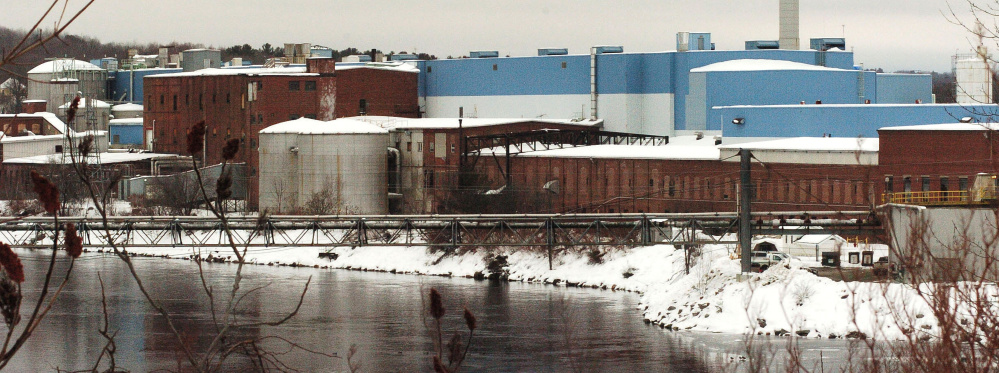MADISON — Gregory Schain at New Mill Capital Holdings in New York City points to one recent success his company has had in Maine as he looks to the company’s newest acquisition: the shuttered Madison Paper Industries mill.
New Mill Capital’s success came with the sale and re-purposing of the 265,000-square-foot Hostess Brands bakery in Biddeford a year ago.
FedEx opened a distribution center there last year, Schain said.
“If you look at our history of projects, we buy a lot of closed plants all around the country,” Schain said in a phone interview Tuesday. “It’s never our intention to see a plant sit idle. It’s not in our interest, it’s not in the town’s interest, it’s really not in anybody’s interest. Our plan long-term is to see something happen at that site.”
The Madison mill property was sold last week to a joint venture of New Mill Capital and Perry Videx, of Hainesport, New Jersey, and Infinity Asset Solutions, of Toronto. Former mill owners UPM-Kymmene Inc. and Northern SC Paper Corp., a subsidiary of The New York Times Co., announced the sale of the mill site Friday in an emailed statement.
Madison Paper closed in May, putting about 215 people out of work.
Schain said one of the provisions of the sale is that UPM has restricted the use of some of the equipment on site, meaning certain parts of the paper machine and equipment will have to be sold so another company can’t compete with and undercut UPM in the paper market.
New Mill Capital can not move in a company that would produce the supercalendered paper that UPM was making at about 195,000 tons a year when the mill closed.
“There are certain parts of the paper machine that are considered proprietary for UMP. They’re forcing us to basically scrap it or sell it off site,” he said. “That includes the head box and a couple of other pieces that are considered critical. No one who produces supercalendered paper can use that equipment on site or off site. Nobody can come in and do what they were doing again.”
Schain said by comparison, what New Mill Capital did in Biddeford was a success at filling the entire space left vacant when Georgia-based Flowers Foods vacated the Hostess premises, a 40-acre property within a mile of the Maine Turnpike. Flowers Food did not allow another baker to take over the property, Schain said.
“FedEx is now distributing all throughout New England from that building, who were able to find another use for it and bring jobs back to the site, ” he said.
The Madison mill acquisition — which closed Thursday for an undisclosed price — includes the real estate of the main paper mill site as well as all mill equipment. The mill’s hydro power assets are being marketed separate from the mill transaction.
Schain said his company and their partners will look at the equipment that they are allowed to keep at the Madison site that can possibly be used for other papermaking or other uses, as they did in Biddeford. He said the Madison mill site has two areas, one section built in the late 1800s and the new section completed around 1980.
He said the older section is obsolete and would have had to be demolished no matter who purchased the property.
“The newer building is really nice. It’s great industrial space,” he said. “We’ll have to do some improvements, but it’s good space and we’re hoping it’s marketable and we’ll probably bring in a regional commercial real estate broker to help us find somebody.”
Schain said his company has purchased more than 11 million square feet of space in the last five years and almost all of it has been put back to use. He said other paper mills have left “and just scrapped the place and left a blank space in the middle of town.”
“That’s certainly not our intent,” he said. “If that was going to be our business plan, I wouldn’t have bothered doing this deal in the first place. It’s certainly in everyone’s best interest to bring in the best use we can for the site.”
Maine forest products consultant Lloyd Irland, of Wayne, said other former paper mill towns in Maine have not been so lucky. Five mills have closed in the last two years and more than 2,300 workers have lost their jobs since 2011 as the industry tries to cope with declining global demand for paper, leaving just six working mills left in Maine.
Mills in Millinocket, Bucksport and Lincoln have been largely taken apart and hauled away. In general, he said, mill owners sell off “basically everything you could unbolt from the floor and put into a small truck — all the tools, all the internal small items,” Irland said.
“The process of moving the big equipment has been slow. It was actually going out by barge, I believe,” he said. “In some of the other mills, it’s kind of amazing how much of the big machinery has been dismantled. Some of it’s been shipped to China.”
Irland said the demand for paper in the United States and worldwide has dropped significantly as consumers look to new digital sites to get their news and information. He added that the size of the newer paper machines makes the one in Madison less than competitive on the global market.
“The new world-class mills that are being built are like 10 times the capacity of this mill,” he said. “And the market these sorts of paper have has just been shrinking. People just aren’t buying newspapers, and imports from China have not been helping.”
In Bucksport, Rich Rotella, the town’s community and economic development director, said about 15 percent of the former Verso Paper mill remains in place and in use. The rest, he said, is being demolished and most of it sold for scrap.
“The entire mill is not going to be demolished,” Rotella said of the mill, which shut down in December 2014. AIM Development, a subsidiary of Montreal-based scrap metal dealer American Iron & Metal, acquired the property from Verso in 2015.
He said the mill’s power plant, the employee development center and the biomass boiler and generator will remain in place.
“We’ve had a few interested parties who are interested in redeveloping the site for their business,” Rotella said. “The last party we have spoken with and we are reviewing their plan is the Maine Maritime Academy. They would occupy one of the buildings and the dock area if they were to go forward with their plan.”
Doug Harlow — 612-2367
Twitter:@Doug_Harlow
Send questions/comments to the editors.




